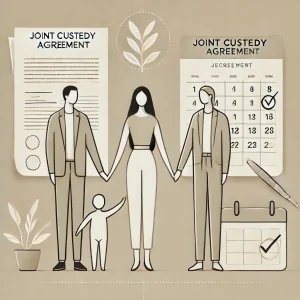Joint Custody | Did you get a divorce lawsuit? Every action or statement you will make from now on, will have an impact on the result that will be achieved and therefore an urgent personal counseling session is necessary for you.
Joint custody is in fact is such that usually, the child’s will split his stay with his parents 50/50 – as is well known, a child needs both parents to be present in his life, especially when both parents were present in his life until the day of the divorce. The Legal Qualifications and Guardianship Act speaks of equal guardianship between the parents, and it does not matter if they are married, separated, divorced, publicly known or two parents who have joined together in a joint parenting agreement for the purpose of having children. Guardianship by law is equal and cannot be waived or revoked, except in particularly extreme cases. The Legal Qualifications and Guardianship Act explicitly states that parents are the natural and equal guardians of their children and that the parents must act in the best interests of the minor.
The law also stipulates the presumption of infancy, according to which children up to the age of 6 are in the custody of their mother unless there are special circumstances in which the custody will not be accepted. As a result, most of the rulings of the Family Courts and Rabbinical Courts have ruled that the children will be in the custody of their mother. Due to the spirit of equality that blows in the State of Israel, the legislature is called upon to change the legislation and abolish the presumption of early childhood. In 2005, the Schnitt Committee was established by the Minister of Justice at that time, Ms. Tzipi Livni, due to the need to examine the legal aspects of parental responsibility in divorce. This is a public committee, called the “Schnitt Committee”.

The Schnitt Committee has worked extensively on this matter for years, and published its final conclusions in 2011. As part of its conclusions, the Schnitt Committee decided to abolish the presumption of early childhood, and also coined a new concept – the joint parental responsibility. The committee decided that in accordance with the overriding principle in family law, which is the principle of the best interests of the child, the abolition of the presumption of infancy should be ordered and a parenting arrangement should be established according to which the child’s time with each parent should be divided.
As of today when writing these lines, 2019, the decisions of the Schnitt Committee have not yet been adopted in Knesset legislation, but the effects of the committee’s conclusions have permeated into Israeli case law. Many family court judges today refrain from mentioning the words “custody” as well as “visitation arrangements” and they state in their rulings the new terms of “division of parental responsibility” and “division of time of stay” between parents.
In the reports of civil service social workers, a change in trend can also be seen, according to which there is a tendency to use the words “custody” or “visitation arrangements”. In the reports, the welfare officials indicate the terms “division of residence time” and “division of parental responsibility”. In addition, following the Schnitt Committee, there is a tendency for some judges to even establish joint custody even in cases where there are children under the age of 6. The welfare officials, today, have also begun to recommend joint custody. In those cases where joint custody was determined, alimony also decreased by 50 percent or more (of course, taking into account the parameters of income and expenses).
If so, the terminology of the terms “custody” and also “visitation arrangements” has vanished from the face of the earth, and has been replaced by authentic terms in family law and all under the equality revolution in Israel. The term used today is “residence arrangements”. The term refers to women and men without gender differences. In practice, the children’s stay days are divided between the mother and the father.
The question of alimony in joint custody and especially how the alimony in joint custody is calculated, certainly worries any parent facing divorce proceedings. The calculation of alimony in joint custody has recently changed, and has taken a significant turn in a precedent ruling given in 2017 by the Supreme Court in case 919/15, with an expanded forum of seven judges, things have changed, and the way alimony will be determined from now on:
At the age of 6-15, both parents are equally obliged to their child support law, while the division between them will be determined according to their relative economic capabilities from all the sources available to them, including wages, subject to the division of actual physical custody, taking into account the circumstances of the case.

The application of this principle in the typical case of joint physical custody will be made in the spirit of the principles stated in paragraph 61 of the opinion of Justice D. Barak-Erez, as a default which may be deviated from. On the aforesaid side, the Family Court must exercise its discretion in the circumstances of each case.
The main question facing many couples who are facing divorce, is what will they actually have to pay. How will the alimony be calculated? In the same ruling, the Honorable Justice Dafna Barak Erez translated the new approach of the court regarding alimony into practice:
The principles that should apply, in my opinion, with regard to carrying alimony in joint custody of children aged 6-15 are:
A) In joint custody, each parent will bear the current subsistence expenses related to the children and therefore these expenses will be “offset” without the need to transfer payments between the parents (according to a certain percentage of the alimony rate ordered by the Family Court, according to the age of the children Out of all their needs embodied in alimony).
B) A mechanism will be established for concentrating the treatment of expenses that are not current subsistence expenses, but “other needs” (such as clothing, books, unexpected medical care, etc.). Normally, this will be a mechanism of a central parent who will receive payment of half of these expenses from the other parent (in a situation of equal earnings). At the same time, other solutions can be considered, such as a joint bank account of the parents, all at the discretion of the court according to the family circumstances. In the absence of any other determination, the Central Parent will be the one whom the Family Court will find to have served as a divorcee as the primary caregiver for the children.
C) The parents will continue to share the exceptional expenses, subject to their earning capacity and in accordance with the mechanism to be determined by the Family Court.
D) Each parent shall bear the costs of the minors’ accommodation, provided that the court precedes and examines whether the double burden of carrying in the accommodation suitable for the children does not impair the parent’s ability to meet their child support needs.
In October 2012, the report of the Shipman Committee examining the issue of child support in Israel was published. The committee recommended that the calculation of child support and the financial support that until today was according to Jewish religious law, will now be determined according to civil law, and especially according to the financial capacity of both parents and the length of time the children stay with each other. The committee was based on economic data from Israel and abroad and developed a formula for calculating alimony that will be imposed on parents. The overriding principle of the committee is that the financial responsibility for the children applies to both parents. The payments of the “halves”, the after-school classes payments, extra medical care expenses, and tutoring, which to this day have been divided equally between the two parents, will also be divided in relation to their income.
According to the committee’s conclusions, the same formula developed by the committee will suit most of the children of the State of Israel. This is a kind of ‘alimony index calculator’, into which the data will be entered, including the parent’s salary, expenses, additional sources of income, as well as the child’s needs, and thus alimony will be calculated in joint custody. In other, exceptional situations, for example: in a situation where the child is disabled or needs special needs, this case will be examined in a special way.
Since there is no fixed alimony for each and every child, the court rules the alimony in each case on its own merits after examining all the relevant parameters. What parameters are involved? There are parameters related to the necessary needs of the child and the standard of living to which he is accustomed. For example, if the child was accustomed to a certain number of classes a week or to psychological, emotional therapies, the court would try to consider this matter. A second parameter, related to parents and their financial ability. When the court comes to rule on alimony, it will examine the actual income of the father, his earning potential whether he receives financial assistance from an external source and how much. The court will examine assets that are in the possession of the father and whether he is financing another, new family. In accordance with the new trend of the courts, the mother’s financial ability, her earning potential, and the other parameters that have been examined by the father will also be examined. The calculation of alimony in joint custody will be different and more equal for both parents since the court will calculate the alimony when it assumes that both parents bear the child’s expenses equally since he stays with both of them equally.
It is important for me to tell you one thing that is important for you to remember – children are the main victims in most cases of the divorce process and they should be protected and remember their sensitivity towards you. Children have sensitive receptors and sharp senses that perceive the environment in general and you in particular. The natural tensions that accompany the divorce process do not go under the radar of the children as parents might have hoped, but are absorbed and significantly influencing them. Your task as parents is to put the best interests of the children first, to understand that they are going through an emotionally difficult process and to show a sympathetic ear to the children because their receptors in the sensitive situations between their parents, “work” even harder.
Your task as a parent is to help your children get through this complex and not-so-simple period with a minimum of emotional vulnerability, even if it imposes on you sometimes forced restraint and respectful behavior, despite your initial instincts which may lead you to unnecessary outbursts. Sensitive and accepting behavior towards your children will help reduce the intensity of the injury to some extent and reduce the negative precipitation that such a process may leave in them. Remember, children come first and we, as parents, must not hurt them.